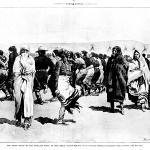Repentance is not when you cry, it’s when you change.
Repentance isn’t necessarily measured by the presence of tears; it is measured by the presence of change. If you want to be a leader who leads others to life, you need to be well-acquainted with repentance. Simply put, repentance and lament are the pillars of transformational leadership.
What is repentance?
Repentance is when you willingly acknowledge where you have (or are currently) missed the mark.
It involves coming face to face with the impact and loss of those behaviors, mindsets, or actions. It’s when you lament—when you mourn the loss that has occurred to yourself, to those around you, and most importantly, to God.
Then, repentance looks like turning from the false bullseye to face God completely. Most people stop here, but this is where it gets good. And if you want to be one who leads others to life, you can’t skip these next steps (but be warned, you’ll be tempted to).
The glory in death.
Repentance involves death—not a self-inflicted, behavior-modification death-to-all-the-things-that-please-me, but the death of your very bones. The death of the frail, dry structures that fuel our inclination to turn away from God.
Those dry bones get crushed.
But take hope in Psalm 51:8: “Let the bones you have crushed rejoice.” Those bones will one day rejoice in the salvation and glory of our risen King because they will have tasted that same resurrection power. Those bones will sing a new song, and that song will turn eyes toward Christ.
Is this not a beautiful picture of leadership? Repentance is one of the ways we get to participate in the resurrection glory of the gospel daily.
Please, if you call yourself a leader, become friends with repentance. Not only will you lead from a place of rest, power, and deep delight, but those around you will be able to, too.
My own story of repentance.
God called me to leadership, but I felt disqualified. Others seemed more equipped, more charismatic, more prepared, more endorsed. I felt… to put it lightly… insecure. To overcome the discomfort of my insecurity, I read leadership books and planned and vision-boarded, but it wasn’t enough.
All the striving in the world couldn’t sustain the weight of the vision the Lord had called me to; I needed transformation.
For years, Psalm 51:8 has been an unusual anthem in my heart. When I realized my insecurities were rooted in sin, the picture of dry bones one day rejoicing gave me solace. This sin of mine may not have started with me, but I certainly tended to it over the years.
Sin produces death.
This sin looked like discounting God’s written word of identity over my life in favor of the voice of man.
It looked like treasuring the work of my hand over the work that the Lord could do (and wanted to do) in the situations I felt most weak.
Sometimes, it looked like unnecessarily guarding my heart around others out of fear that God wouldn’t step in to protect me in my most vulnerable moments.
This sin produced sarcasm, division, and bitterness, but it was often hidden behind a soft tone and a smile.
Ultimately, this sin produced death to my leadership and death to my heart. I needed to repent and be transformed.
Through lament, I met the sweetness of God in the middle of my mourning. And I found the courage to face my sin and endure the pressing of true transformation. If you want to be a leader in today’s culture, you need to embrace the painful beauty of repentance and lament. This is what the Lord invites us to daily. It’s a difficult path, but it’s necessary to grow the bones that will sustain the weight of your calling.
The Seven Stages of Repentance within Psalm 51:
Stage 1: Awareness of Sin (Verses 1-3)
Like David, we first become aware of our actions steeped in pride, recognizing that we have hurt not only ourselves but also God and others. This self-awareness is the crucial first step toward lament, repentance, and transformation.
Stage 2: Awareness of the Effect of Sin (Verse 4)
Our actions are a sin, an assault against God’s goodness. We acknowledge that God’s assessment of our need for mercy is accurate. This realization humbles us further.
Stage 3: God’s Invitation to Turn (Verses 5-6)
Despite our wickedness, God desires and invites us to live in truth and freedom. This invitation is an act of grace and an opportunity for us to return to Him.
Stage 4: Our Response (Humility and Repentance)
In humility, we finally come to a place of repentance, recognizing our need for God and asking Him to change us. This step requires genuine contrition and a willingness to change.
Stage 5: God Changing Us
Similar to David’s experience, we must not shy away from letting God transform us completely. We ask for a willing spirit to endure being cleansed, our bones being crushed, and our inequities being blotted out.
Stage 6: Being a Testimony/Witness
As we go through this transformative process, our lives become a powerful testimony. Our actions speak louder to transgressors than our words ever will. Our repentance serves as a beacon of hope for those who have strayed.
Stage 7: God is Exalted
God desires more than a superficial sacrifice to cover our sins. He seeks to fully purge and resurrect our hearts. He will do this out of kindness and mercy, not leaving us broken but offering us a perfected resurrection.
Leaders, embrace the call to repent.
I’ve encountered so many moments when my pride blinded me to my shortcomings. However, in my devotion to God, I’m finding the courage to acknowledge my need for His grace and change.
If you’re a woman who loves God and follows Christ, you are meant to be a leader in this world. But if you want to be a leader in today’s culture, you need to embrace the call to repent. This is what the Lord invites us to daily. It’s a difficult path, but it’s necessary to grow the bones that will sustain the weight of your calling.
New here? Everyday Shalom is all about living in the shalom of God every day, to lead others to God’s shalom in every season, and has been particularly crafted to serve women who lead as ministry- whether at home, in their communities, in the marketplace, on platforms or in the pews! Check us out on Instagram or explore our blog for more enriching content on spiritual formation and leadership! You can also download our free resources to begin your journey towards leading from a place of rest, with power and deep delight, through every season and stage.










